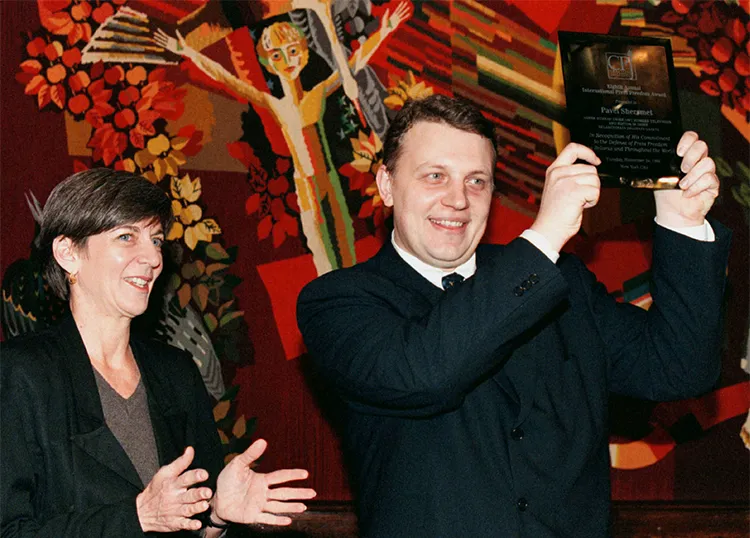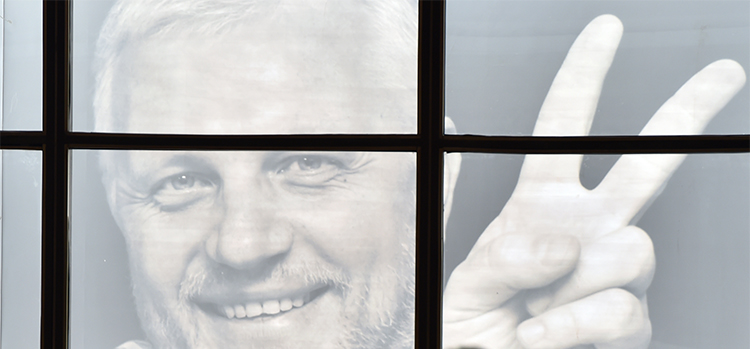Ukraine must prove its commitment to credibly investigating Sheremet’s murder
Pavel Sheremet was a journalist of rare caliber, one whose reporting exemplified the best practices in the countries he covered: Belarus, Russia, and Ukraine. Despite threats and attacks during his career, Sheremet was not afraid to take on authorities. It was for this reason that CPJ honored him with an International Press Freedom Award in 1998.
When a car bomb killed Sheremet on July 20, 2016, the journalism community lost not only a colleague but an ardent supporter. His eloquent style and pursuit of truth is what led CPJ in 2005 to ask Sheremet to lead a conference in Moscow highlighting impunity in the murders of journalists in Russia. It was a perfect fit. For years, Sheremet demanded answers to the disappearance and presumed killing in 2000 of his colleague and friend, Belarusian cameraman Dmitry Zavadsky, and he spoke passionately in Moscow about the need to fight for justice, ask tough questions, and demand answers. Sheremet was able to infect everyone present with his belief that when working together, truth will out and justice will prevail. Now, more than 10 years later, CPJ is demanding answers into Sheremet’s murder.
Sheremet’s death took place at a divisive time in Ukraine. In 2016, CPJ documented attacks and hostility against journalists who covered the government critically or questioned its handling of the conflict with Russia-backed separatists. Nationalistic groups verbally assaulted or threatened journalists reporting from the east. In some instances, government and security officials—including the Interior Minister overseeing the department investigating Sheremet’s murder—not only stood by, but cheered the attackers on.
Against that backdrop, the murder of such a prominent figure sent reverberations through Ukraine’s press corps. Independent journalists there say they continue to dig into sensitive topics—corruption, abuse of office, the war in the east—but at an increased sense of peril. Ukrainska Pravda’s editor-in-chief, Sevgil Musayeva-Borovik, told CPJ, “I fear for the safety of my colleagues ever since [Sheremet’s death]. After this murder, you want to be careful. I don’t know how long this feeling will last.” Yevgeny Kiselyov, a Russian journalist and International Press Freedom Awardee, added, “A journalist can be killed as an edifying lesson to others. It says, ‘Don’t try too much.’”

Ukrainian authorities say they are committed to solving Sheremet’s murder, but offer no clear evidence to back their primary line of investigation of Russian involvement. At a time of tension between the two countries, pinning the killing of such a high-profile figure as Sheremet on Russia is politically convenient for Ukraine. Many of Pavel’s relatives and colleagues say they are not convinced.
Ukraine’s President Petro Poroshenko pledged to solve the murder as a matter of honor. But a year later the case presents more questions than answers. Does Ukraine have evidence of Russian involvement? Are Ukrainian authorities thoroughly investigating why Sheremet was under surveillance? How do they account for the presence of a former SBU agent outside the journalist’s home the night before he was killed?
As is often the case in former Soviet bloc countries, the journalist community has been left to do the work of authorities. One of the few new and substantive pieces of information in Sheremet’s case came from “Killing Pavel” a documentary released in May 2017 by the investigative journalism organizations Organized Crime and Corruption Reporting Project and Slidstvo. The team identified a former SBU agent seen on security camera footage outside Sheremet’s apartment building on the night two unidentified assassins planted explosives under the journalist’s car. (The former agent denies involvement in the murder. Authorities say he has now been questioned, and police say they are investigating his presence in the vicinity.)
The presence of the former SBU agent, coupled with Sheremet’s allegations prior to his murder that he was under surveillance for months, add to concerns voiced by those following the progress of the case that authorities are not fully investigating the possibility of Ukraine involvement.
Such a possibility casts doubt on the credibility of the official investigation. To restore confidence in the investigation, Ukraine should consider inviting an independent international inquiry to ensure that every motive is thoroughly examined and that justice is achieved. If Ukraine is serious in its stated commitment to European Union integration, it must embrace the bloc’s fundamental principle of respect for a free and independent press. Then and only then will Ukraine live up to the ideals of democracy that led Pavel Sheremet to live and work there.
